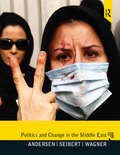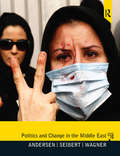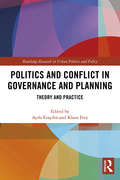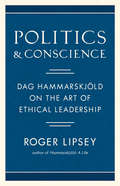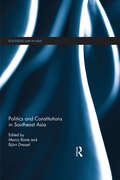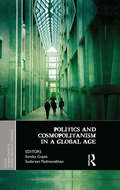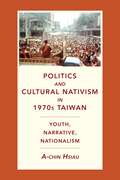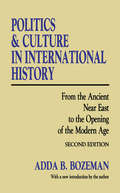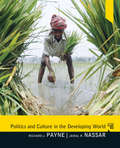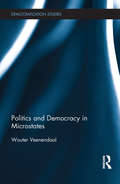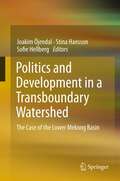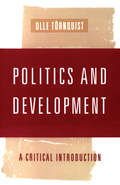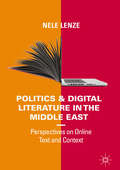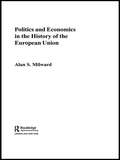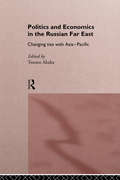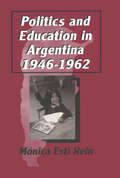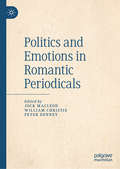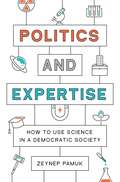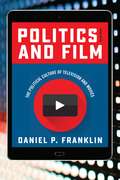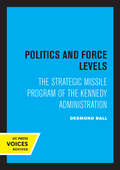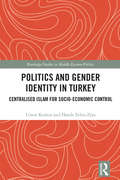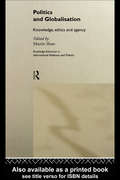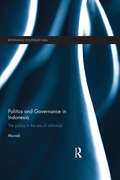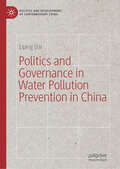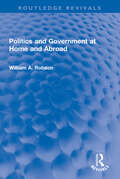- Table View
- List View
Politics and Change in the Middle East: 10e
by Roy AndersonA longtime bestseller, Politics and Change in the Middle East employs a multidisciplinary approach to comprehensively and evenhandedly study the region‘s past, present, and future. Through politics, economics, culture, and history, this text offers a rugged analytical framework that familiarizes students with the Middle East and helps them to critically evaluate contemporary developments. Thematically organized, Politics and Change in the Middle East introduces students to the primary actors and issues that define the region and its role in world politics.
Politics and Change in the Middle East: New International Edition
by Roy R. Anderson Robert Seibert Jon G WagnerA longtime bestseller, Politics and Change in the Middle East employs a multidisciplinary approach to comprehensively and evenhandedly study the region’s past, present, and future. Through politics, economics, culture, and history, this text offers a rugged analytical framework that familiarizes students with the Middle East and helps them to critically evaluate contemporary developments. Thematically organized, Politics and Change in the Middle East introduces students to the primary actors and issues that define the region and its role in world politics.
Politics and Conflict in Governance and Planning: Theory and Practice (Routledge Research in Urban Politics and Policy)
by Ayda Eraydin Klaus FreyPolitics and Conflict in Governance and Planning offers a critical evaluation of manifold ways in which the political dimension is reflected in contemporary planning and governance. While the theoretical debates on post-politics and the wider frame of post-foundational political theory provide substantive explanations for the crisis in planning and governance, still there is a need for a better understanding of how the political is manifested in the planning contents, shaped by institutional arrangements and played out in the planning processes. This book undertakes a reassessment of the changing role of the political in contemporary planning and governance. Employing a wide range of empirical research conducted in several regions of the world, it draws a more complex and heterogeneous picture of the context-specific depoliticisation and repoliticisation processes taking place in local and regional planning and governance. It shows not only the domination of market forces and the consequent suppression of the political but also how political conflicts and struggles are defined, tackled and transformed in view of the multifaceted rules and constraints recently imposed to local and regional planning. Switching the focus to how strategies and forms of depoliticised governance can be repoliticised through renewed planning mechanisms and socio-political mobilisation, Politics and Conflict in Governance and Planning is a critical and much needed contribution to the planning literature and its incorporation of the post-politics and post-democracy debate.
Politics and Conscience: Dag Hammarskjold on the Art of Ethical Leadership
by Roger LipseyAn accessible guide to the principles and vision of Dag Hammarskjöld, a man John F. Kennedy called "the greatest statesman of our century."Dag Hammarskjöld served as Secretary-General of the United Nations from 1953 until his tragic Dag Hammarskjöld served as secretary-general of the United Nations from 1953 until his tragic death in a suspicious plane crash in 1961. During those years he saw the fledgling international organization through numerous crises with skill that made him a star on the international stage. As readers of his now-classic diary, Markings, are aware, Hammarskjöld understood political leadership as an honor calling for resourcefulness, humility, moral clarity, and spiritual reflection.In this accessible handbook, acclaimed biographer Roger Lipsey details the political and personal code by which Hammarskjöld lived and made critical decisions. What emerges is the portrait of a man who struck a remarkable balance between patience and action, empathy and reserve, policy and people. Structured through short sections on themes such as courage, facing facts, and negotiation, Politics and Conscience offers a vision of ethical leadership as relevant today as it was in Hammarskjöld&’s time.
Politics and Constitutions in Southeast Asia (Routledge Law in Asia)
by Marco Bünte Björn DresselIn recent years the constitutional landscape of Southeast Asia has changed tremendously. Against a worldwide background of liberalization, globalization, and democratization, states in the region have begun to alter their constitutions, reinforcing human rights provisions, and putting in place institutional safeguards, such as constitutional courts and human rights commissions. On closer examination, however, the picture is very complex, with constitutional developments differing greatly between states. This book explores a range of current constitutional developments in the different states of Southeast Asia through a distinct political lens. Drawing on comparative and single case studies, it considers various constitutional areas, including constitution drafting, human rights, legal safeguards and the continuing role of the military, sets constitutional developments in the wider political and historical context of each country, and makes comparisons both with Western democracies and with other developing regions. The book concludes by assessing overall how far constitutional practices and trajectories are converging towards a liberal Western model or towards a distinctly Southeast Asian model.
Politics and Cosmopolitanism in a Global Age (Ethics, Human Rights and Global Political Thought)
by Sonika Gupta Sudarsan PadmanabhanThis book offers a unique reconceptualization of cosmopolitanism. It examines several themes that inform politics in a globalized era, including global governance, international law, citizenship, constitutionalism, community, domesticity, territory, sovereignty, and nationalism. The volume explores the specific philosophical and institutional challenges in constructing a cosmopolitan political community beyond the nation state. It reorients and decolonizes the boundaries of ‘cosmopolitanism’ and questions the contemporary discourse to posit inclusive alternatives. Presenting rich and diverse perspectives from across the world, the volume will interest scholars and students of politics and international relations, political theory, public policy, ethics, and philosophy.
Politics and Cultural Nativism in 1970s Taiwan: Youth, Narrative, Nationalism (Global Chinese Culture)
by A-chin HsiauIn the aftermath of 1949, Taiwan’s elites saw themselves as embodying China in exile both politically and culturally. The island—officially known as the Republic of China—was a temporary home to await the reconquest of the mainland. Taiwan, not the People’s Republic, represented China internationally until the early 1970s. Yet in recent decades Taiwan has increasingly come to see itself as a modern nation-state.A-chin Hsiau traces the origins of Taiwanese national identity to the 1970s, when a surge of domestic dissent and youth activism transformed society, politics, and culture in ways that continue to be felt. After major diplomatic setbacks at the beginning of the 1970s posed a serious challenge to Kuomintang authoritarian rule, a younger generation without firsthand experience of life on the mainland began openly challenging the status quo. Hsiau examines how student activists, writers, and dissident researchers of Taiwanese anticolonial movements, despite accepting Chinese nationalist narratives, began to foreground Taiwan’s political and social past and present. Their activism, creative work, and historical explorations played pivotal roles in bringing to light and reshaping indigenous and national identities. In so doing, Hsiau contends, they laid the basis for Taiwanese nationalism and the eventual democratization of Taiwan.Offering bracing new perspectives on nationalism, democratization, and identity in Taiwan, this book has significant implications spanning sociology, history, political science, and East Asian studies.
Politics and Culture in International History: From the Ancient Near East to the Opening of the Modern Age
by Adda B. BozemanThe current political conflicts in Somalia and Russia make the reappearance of this book as relevant as ever. Politics and Culture in International History illumines world politics by identifying the causes of conflict and war and assessing the validity of schemes for peace and unity. Bozeman maintains that political systems are grounded in cultures; thus, international relations are by definition hitercultural relations. She deals exclusively with the thought patterns of the world's literate civilizations and societies between the fourth millenium B.C. and the fifteenth century A.D.In a substantial new introduction, Bozeman analyzes world politics over the last half century, showing how the interplay of politics and culture has intensified. She notes that the world's assembly of states is no longer held together by substantive accords on norms, purposes, and values, but by loose agreements on the use offorms, techniques, and words. The causes and effects of these changes between the 1950s and 1990s are assayed by Bozeman.
Politics and Culture in the Developing World
by Richard J Payne Jamal NassarFrom decolonization and democratization to religion and gender, Politics and Culture in the Developing World is a comprehensive survey of the global context of development. With in-depth and current examples from Asia, Africa, Latin America, and the Middle East., this text examines the central political themes in the developing world. Throughout, Politics and Culture in the Developing World demonstrates how globalization both accelerates change and increases interdependence between developing and developed countries.
Politics and Democracy in Microstates (Democratization and Autocratization Studies)
by Wouter VeenendaalWhy are small states statistically more likely to have a democratic political system? By addressing this question from a qualitative and comparative methodological angle, this book analyses the effects of a small population size on political competition and participation. By comparing the four microstates of San Marino (Europe), St. Kitts and Nevis (Caribbean), Seychelles (Africa), and Palau (Oceania), it provides fresh and stimulating insight, concluding that the political dynamics of microstates are not as democratic as commonly believed. Instead, it is found in all four cases that smallness results in personalistic politics, dominance of the political executive, patron-client relations between citizens and politicians, and the circumvention of formal political institutions. In addition, the book suggests that the study of formal institutions provides an incomplete image of microstate democracy and that informal characteristics of politics in microstates also need to be explored in order to better explain the influence of smallness on democracy. This book will be of key interest to scholars and students of democracy, democratization, regional and decentralization studies and comparative politics.
Politics and Development in a Transboundary Watershed
by Joakim Öjendal Sofie Hellberg Stina HanssonWater - and its governance - is becoming a global concern partly because it is turning into a goods in short supply, with devastating effects on literally billions of people, but also because it is the "carrier" of global warming; whether through irregular weather patterns or through flooding, water is how global warming will be 'felt'. The lion's share of the globally available fresh water resources is to be found in transboundary systems. In spite of its significance, the generated knowledge on how to deal with transboundary waters is weak and leaves policy makers with seemingly unavoidable, trade-off dilemmas and prioritizations, often with detrimental effects. In order to disentangle this predicament this volume works with one case: the Lower Mekong Basin and covers state-of-the-art academic and practitioners' knowledge and hence appeals to a wide audience. The topic this volume addresses is situated in the nexus of an IR- (International Relations) approach focussing on transboundary politics and its inclination to remain within the sphere of state sovereignty and national interest on the one hand, and Development studies, with its imperatives on participation, planning, and intervention, on the other. The dilemma, we argue, of better understanding transboundary water management lies in how to understand how these two rationalities can be simultaneously nurtured. Audience: This book will be relevant to scholars, as it provides cutting-edge research, and students, since it covers the primary debates in the field, interested in resource management, regional politics, and development issues in the area. It also addresses the global debate on transboundary water management and presents an in-depth case of one of the globally most sophisticated attempts at pursuing sustainable river basin management. Finally, practitioners and policymakers would benefit greatly because all contributions have explicit policy relevance, launching suggestion on improvements in water management.
Politics and Development: A Critical Introduction
by Olle TörnquistThis major textbook provides a clear and comprehensive introduction to the main analytical approaches and their use in the study of third world politics and development. The author outlines the difficulties in the various analytical approaches to the study of development within political science; presents a critical overview of each of the main schools of thought and explores the contemporary issue of democratization to illustrate how students can apply a framework for research and critically develop a perspective on their own.
Politics and Digital Literature in the Middle East: Perspectives On Online Text And Context
by Nele LenzeDuring the 2000's, online literature in Arabic language was popular among a larger readership. Writings on subjects dealing with politics, globalization, and social matters gained are well-received. While mapping the genre, this monograph shows literary developments in print and digital during these peak years to provide a historical context for the material. Online literary culture is linked to social, economic, and political developments within the last two decades. This book presents the differences between online and print literature as it relates to writer-readership interaction, literary quality, language and style, critical reception, and circulation. The geographic location of the analysis focuses on Gulf countries featuring a comparative study of Egypt and Lebanon.
Politics and Economics in the History of the European Union (The Graz Schumpeter Lectures)
by Alan MilwardThe Graz-Schumpeter annual lectures have grown in reputation over the years with impressive figures from academia such as Ian Steedman, J. Stanley Metcalfe and Duncan K. Foley contributing their own impressive series of lectures. The books produced as a result of these lectures are no less impressive and this latest volume from Alan Milward is a typically authoritative read.
Politics and Economics in the Russian Far East: Changing Ties with Asia-Pacific
by Tsuneo AkahaPolitics and Economics in the Russian Far East addresses the key issue of what the Russian Far East and its Northeast Asian neighbours can do to further closen economic and co-operative relationships. The question of to what extent the state should intervene to stimulate economic growth in the Russian Far East is covered, as are the options for a more laissez-faire approach. The possibilities for economic co-operation with the more successful market economies of the region are discussed as are the problems and opportunities presented by the exploitation of Russia's vast natural resources.This book will be essential reading for all those wishing to obtain a deeper understanding of the complexity of the issues involved in the development of co-operative relationships between Russia and its Asia-Pacific neighbours.
Politics and Education in Argentina, 1946-1962
by Monica ReinThis study focuses on the formal education system in Argentina during the 1940s, the 1950s, and the early 1960s. It analyzes the link between politics and education against the backdrop of changing social conditions in Argentina under the regimes of Peron, Lonardi and Aramburu (the Liberating Revolution), and Frondizi, by evaluating textbooks, official bulletins, childrens' periodicals, speeches, and personal interviews.
Politics and Emotions in Romantic Periodicals
by William Christie Jock Macleod Peter DenneyThis book comprises eleven essays by leading scholars of early nineteenth-century British literature and periodical culture. The collection addresses the many and varied links between politics and the emotions in Romantic periodicals, from the revolutionary decade of the 1790s, to the 1832 Reform Bill. In so doing, it deepens our understanding of the often conflicted relations between politics and feelings, and raises questions relevant to contemporary debates on affect studies and their relation to political criticism. The respective chapters explore both the politics of emotion and the emotional register of political discussion in radical, reformist and conservative periodicals. They are arranged chronologically, covering periodicals from Pigs’ Meat to Blackwood’s Edinburgh Magazine and the Spectator. Recurring themes include the contested place of emotion in radical political discourse; the role of the periodical in mediating action and performance; the changing affective frameworks of cultural politics (especially concerning gender and nation), and the shifting terrain of what constitutes appropriate emotion in public political discourse.
Politics and Expertise: How to Use Science in a Democratic Society
by Zeynep PamukA new model for the relationship between science and democracy that spans policymaking, the funding and conduct of research, and our approach to new technologiesOur ability to act on some of the most pressing issues of our time, from pandemics and climate change to artificial intelligence and nuclear weapons, depends on knowledge provided by scientists and other experts. Meanwhile, contemporary political life is increasingly characterized by problematic responses to expertise, with denials of science on the one hand and complaints about the ignorance of the citizenry on the other.Politics and Expertise offers a new model for the relationship between science and democracy, rooted in the ways in which scientific knowledge and the political context of its use are imperfect. Zeynep Pamuk starts from the fact that science is uncertain, incomplete, and contested, and shows how scientists’ judgments about what is significant and useful shape the agenda and framing of political decisions. The challenge, Pamuk argues, is to ensure that democracies can expose and contest the assumptions and omissions of scientists, instead of choosing between wholesale acceptance or rejection of expertise. To this end, she argues for institutions that support scientific dissent, proposes an adversarial “science court” to facilitate the public scrutiny of science, reimagines structures for funding scientific research, and provocatively suggests restricting research into dangerous new technologies.Through rigorous philosophical analysis and fascinating examples, Politics and Expertise moves the conversation beyond the dichotomy between technocracy and populism and develops a better answer for how to govern and use science democratically.
Politics and Film: The Political Culture of Television and Movies (Second Edition)
by Daniel P. FranklinPolitics and Film examines popular movies and television shows as indicators of social and political trends to explore the political culture of the United States. Updated to include the popular and controversial movies and shows American Sniper, House of Cards, Orange Is the New Black, and Twelve Years a Slave, the second edition investigates popular conceptions of government, the military, intelligence and terrorism, punishment and policing, and recognizes mistakes or dark times in our shared history.
Politics and Force Levels: The Strategic Missile Program of the Kennedy Administration
by Desmond BallThis title is part of UC Press's Voices Revived program, which commemorates University of California Press’s mission to seek out and cultivate the brightest minds and give them voice, reach, and impact. Drawing on a backlist dating to 1893, Voices Revived makes high-quality, peer-reviewed scholarship accessible once again using print-on-demand technology. This title was originally published in 1980.
Politics and Gender Identity in Turkey: Centralised Islam for Socio-Economic Control (Routledge Studies in Middle Eastern Politics)
by Umut Korkut Hande Eslen-ZiyaThe creation of Turkish nationhood, citizenship, economic transformation, the forceful removal of minorities and national homogenisation, gender rights, the position of armed forces in politics, and the political and economic integration of Kurdish minority in Turkish polity have all received major interest in academic and policy debates. The relationship between politics and religion in Turkey, originating from the early years of the Republicanism, has been central to many – if not all – of these issues. This book looks at how centralized religion has turned into a means of controlling and organizing the Turkish polity under the AKP (Justice and Development Party) governments by presenting the results from a study on Turkish hutbes (mosque sermons), analysing how their content relates to gender roles and identities. The book argues that the political domination of a secular state as an agency over religion has not suppressed, but transformed, religion into a political tool for the same agency to organise the polity and the society along its own ideological tenets. It looks at how this domination organises gender roles and identities to engender human capital to serve for a neoliberal economic developmentalism. The book then discusses the limits of this domination, reflecting on how its subjects position themselves between the politico-religious authority and their secular lives. Written in an accessible format, this book provides a fresh perspective on the relationship between religion and politics in the Middle East. More broadly, it also sheds light on global moral politics and illiberalism and why it relates to gender, religion and economics.
Politics and Globalisation: Knowledge, Ethics and Agency (Routledge Advances in International Relations and Global Politics #Vol. 8)
by Martin ShawGlobalisation is widely understood as a set of processes driven by technological, economic and cultural change. Few have successfully defined the changing character and role of politics in global change. Political institutions such as the nation-state have been seen as undermined by globalisation, or needing to respond to it. This book clarifies the tensions which global change has provoked in our understanding of politics. Politics and Globalisation suggests that globalisation is a process which is politically contested and even politically constituted. The volume presents five key intellectual and political contests in globalisation: · the extent and political significance of globalising changes in economy and society · how and how far the relations and forms of nation-state organisation are transformed · whether the given concepts and methods of political science as a discipline can be applied to global and regional politics, and whether they require radical reformulation; · the role and significance of ethical questions in global change · whether global change is constituted by, or denies, radical political agency
Politics and Governance in Indonesia: The Police in the Era of Reformasi (Rethinking Southeast Asia)
by MuradiHow does an authoritarian state reform its police force following a transition to democracy? In 1998, Indonesia, the third largest country in the world, faced just such a challenge. Policing had long been managed under the jurisdiction of the military, as an instrument of the Suharto regime – and with Suharto abruptly removed from office, this was about to change. Here we see how it changed, and how far these changes were for the better. Based on direct observations by a scholar who was involved in the last days of the New Order and who saw how the police responded to regime change, this book examines the police, the new regime, and how the police was disassociated from the military in Indonesia. Providing a comprehensive historical overview of the position of police in this change of regime, the book focuses on two key areas: the differences between local and national levels, and the politicisation associated with decentralisation. Arguing that the disassociation of the Indonesian National Police from the military has achieved only limited success, the book contends that there is continued impetus for the establishment of a professional police force and modern and democratic policing, which will entail effective public control of the police. A pioneering study of the police in Indonesia, examining key issues in the post-Suharto era, this book will be of interest to scholars of Southeast Asian politics and of policing and politics in the developing world.
Politics and Governance in Water Pollution Prevention in China (Politics And Development Of Contemporary China Series)
by Liping DaiThis book applies an interdisciplinary governance assessment framework to assess China’s water quality governance from a holistic point of view. The project explores China’s water quality status, water policy discourses, water regulations, public participation in water governance, the path towards green water law, eco-compensation approach in water quality management and the implementation mechanism for achieving water goals. It will appeal to academics in water law, researchers and practitioners dealing with water management, as well as a general audience interested in water issues.
Politics and Government at Home and Abroad (Routledge Revivals)
by William A. RobsonFirst Published in 1967, Politics and Government at Home and Abroad presents William A. Robson’s penetrating observations on the basic requirements of democratic politics and government. Divided into two parts the essays cover a wide field. Part I deals with the fundamental questions of political thought such as relation between freedom, equality, and socialism; education and democracy, and the basic issues of practical government like reform of the British government; and the future of public administration. Part II of the book brings travelogue essays with author’s reflections on India, America, and Russia. This book is an essential read for students and researchers of political science and public administration.
